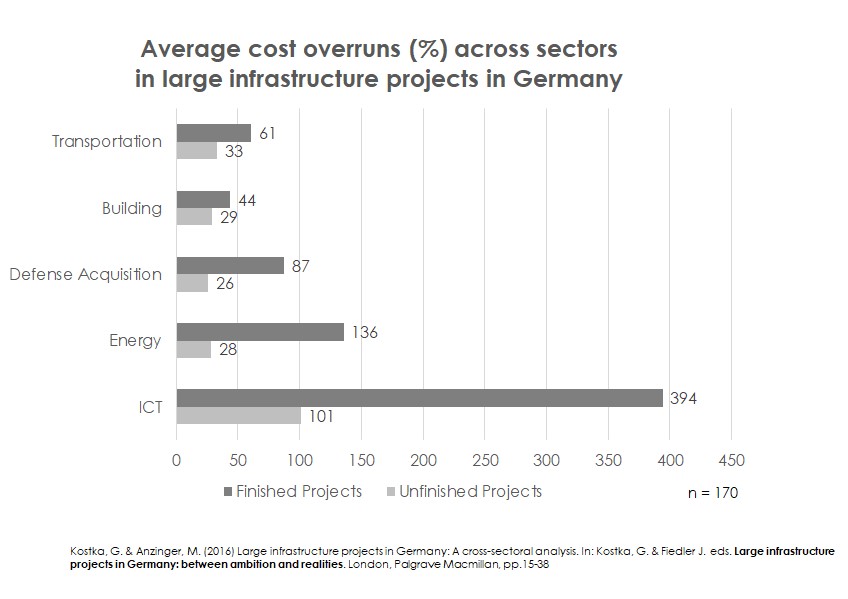Unreliable projects - a Management malpractice

Rainer Erne 05.12.2019
According to a research study of the "Hertie School of Governance" (Kosta & Anzinger 2016) which has investigated 170 large infrastructure projects in Germany between 1960 and today the cost overruns of said projects amounted to 59 billion EUR in total (i.e., instead of 141, 200 billion EUR at minimum).
The cost overrun frontrunners are ICT projects (e.g. HGV toll, electronic healthcare card) displaying close to 400% cost overrun in average as well as energy projects (e.g. plant construction in the context of the EEG law) accounting for 136% cost overrun in average.
The reasons for said party dramatic cost overruns are to be found in the technological degree of innovation, unclear contractual agreements, fuzzy accounabilities including resulting conflicts of interests and also "overoptimism" (psychologically: risk shift) of the involved stakeholders.
This study may serve also as a lesson for many project situations in private organisations which are not disclosed to public research. Also in theses contexts it sometimes appears as a "de facto standard" to atomise accountabilities and responsibilities and to disperse them across different jobs in the organisation. "Governance" issues are homemade in this case.
In order to reduce this case of waste no elaborated "governance" is required, consisting of the steps "direct", "monitor" and "evaluate" (Kirchmer 2017). The only thing needed is the recourse to two old-fashioned principles of organisation: firstly, clear assignment of responsibilities without any overlaps and congruent job design with respect to responsibility, tasks and authority (Reiß 1982, Schreyögg 2010). A great deal of idle performance would be impossible by organising project roles in this way.
Hence, the proper question which should be raised is not: "What is the right project organisation?" Rather, it should be asked: "Why is it hardly possible in modern organisations to assign clear responsibilities?" There might be different answers to this question. Yet it is to be expected that they have one element in common: they are to be found in the field of politics ans political interests.
Literature:
Kostka, G. & Anzinger, M. (2016) Large infrastructure projects in Germany: A cross-sectoral analysis. In: Kostka, G. & Fiedler J. eds. Large infrastructure projects in Germany: between ambition and realities. London, Palgrave Macmillan, pp.15-38
Kirchmer, M. (2017) High performance through Buisness Process Management: strategy execution in a digital world. 3rd ed. Cham, Springer
Reiß, M. (1982) Das Kongruenzprinzip der Organisation. Wirtschaftswissenschaftliches Studium, 11 (2), S. 75-78
Schreyögg, G. (2010) Organisation: Grundlagen moderner Organisationsgestaltung. Mit Fallstudien. 5. Aufl. Wiesbaden, Gabler.
